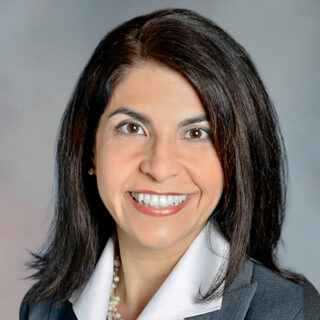As part of its commitment to support and strengthen community organizations across its 15-state footprint, Regions Bank offers no-cost technical assistance to nonprofits through its quarterly Important Insights for Community Organizations webinar series.
Hosted by Gina Sian, head of the Regions Making Life Better Institute®, the sessions draw on the Community Engagement team’s close relationships with local nonprofits to deliver timely, practical guidance. By pairing those insights with the bank’s in-house knowledge and experience, Regions helps organizations address critical needs – one of the most important being financial reporting.
“‘No money, no mission’ is a common phrase in the nonprofit sector. As organizations grow, what becomes evident is that raising funds is not enough to succeed.,” Sian said. “Strong financial practices aren’t just about compliance; they are the foundation to a robust nonprofit organization. Funders, donors and communities need confidence that resources are managed responsibly and aligned with the mission.”
Strong financial practices aren’t just about compliance; they are the foundation to a robust nonprofit organization.
Gina Sian, head of the Regions Making Life Better Institute®
The latest webinar focused on financial reporting practices that help nonprofits tell their financial story effectively and transparently. Speakers included Marta Mendes-Miguel Self, Executive Director of the Regions Foundation; Amanda Saint, Regions Bank Business Unit Controller and Regions Foundation Treasurer; and Meredith Smith, Tax Partner at Mauldin & Jenkins.
The Regions Foundation – a nonprofit funded primarily by Regions Bank – supports organizations that promote education, workforce development, financial wellness and economic and community development.

Marta Mendes-Miguel Self, Regions Foundation Executive Director
Self’s presentation highlighted why financial reporting is central to funding decisions. She explained that funders, in general, aim to maximize impact. “We believe that by funding what is most effective, we’re strengthening the entire ecosystem, and that is how we fulfill our mission,” she said.
Self outlined how financial statements provide critical insights into accountability, sustainability and leadership capacity, helping protect funders’ reputations and missions.
- Demonstrate financial accountability: Grantmakers, whether foundations, government agencies or corporations, want to know their funds are used responsibly. Clear financial reports demonstrate how a nonprofit is managing its resources.
- Show financial health and sustainability: Funders often look at financial statements to assess whether a nonprofit is financially stable and likely to continue operating in the long term. A strong balance sheet and consistent and diversified revenue streams over the years can make a nonprofit more attractive to funders.
- Helps track program impact: When your financial reports include program-specific spending, it helps funders see how their money will be used and what impact it will have.
She then explained how audited financials build confidence in management.
- Establish trust and credibility: Demonstrating transparency and accountability to your auditor also helps build trust with potential funders and shows confidence in the numbers and in your staff. It shows that the organization is serious about its mission and is capable of handling funds in a professional manner.
- Help ensure compliance and a baseline of proper controls: Nonprofits must comply with IRS regulations and other legal requirements. Proper financial reporting signals more confidence that this compliance is achieved.
“Where there’s smoke, there’s fire, but early financial audits can help you spot sparks before they ignite, giving your organization the chance to course-correct and strengthen operations,” Self said. “Due diligence isn’t just a compliance checkbox; it’s a strategic advantage that builds confidence and attracts long-term support. By embracing audits proactively, you turn potential risks into opportunities for growth and make your nonprofit even better.”

Amanda Saint, Regions Bank Business Unit Controller and Regions Foundation Treasurer
With a strong background in accounting and reporting, Saint offered a different and helpful perspective. She emphasized strong financial governance for nonprofits, starting with a solid control environment and “tone at the top” to foster ethics and accountability. Key practices include segregation of duties, independent reconciliations and physical security for financial records. She warned of rising cybersecurity risks, recommending phishing training and multi-factor authentication. Here are some additional top takeaways from Saint’s presentation:
- Formal financial policies and procedures covering approvals, reimbursements, and conflicts of interest protect both organizations and staff.
- It’s important to maintain cash reserves (ideally 3–6 months), especially when the organization’s significant sources of funds are reimbursable grants.
- There are four levels of financial statement assurance (from highest to lowest): audited, reviewed, compiled and internally prepared. While Alabama has no audit requirements for nonprofits, 39 states do. Additionally, many donors and lenders require audited financial statements. Financial audits build trust, ensure compliance and should be considered as organizations grow.
Saint concluded with restricted funds reporting, noting that improper reporting of restricted funds can distort liquidity and pose legal and reputational risks if mismanaged. She advised aligning donor restrictions with strategic plans to avoid mission drift. Transparent reporting and compliance, she stressed, are essential for credibility and sustainability.

Meredith Smith, CPA, Tax Partner at Mauldin & Jenkins, the external accounting firm for the Regions Foundation
Smith’s presentation focused on tax requirements for nonprofits. IRS Form 990, the annual filing required for nonprofits, is due May 15th for December year-end organizations; however, extensions are common. Depending on revenue size and type, filings range from an e-postcard to a full Form 990 with additional schedules. Some additional highlights:
- 990s are public and accessible via IRS, GuideStar and other platforms, so accuracy and professionalism matter. Include clear program accomplishments with metrics and costs, not generic statements, and update annually. Schedule A determines public charity vs. private foundation status, based on donor influence. Large or extraordinary contributions must be monitored to avoid classification issues.
- Board reporting is important. List current members and maintain a balanced board (15–20 members) with diverse expertise, such as finance, legal, marketing and insurance.
- Accurate contact information and public access to audits and 990s are essential for compliance.
Smith concluded by noting that Form 990 includes multiple schedules – such as Schedule B for major donors, non-cash contributions, fundraising events and foreign grants – so nonprofits should work closely with preparers to ensure completeness. “A polished, transparent 990 builds trust with donors and regulators,” she said.
The three presenters then addressed questions from participants, including online payments and controls. Smith advised applying the same principles as cash controls – focus on segregation of duties.
Another question was around functional budgets and Self emphasized that detailed budgets help nonprofits manage resources and demonstrate accountability to funders. Saint added that while Regions Foundation typically requests organizational budgets and audited financials, providing additional functional or program-level detail can strengthen grant applications, “just ensure you meet funder requirements first,” she said.
As the webinar ended, participants returned to their organizations with a better understanding of the importance of financial reporting. Financial transparency and sound governance aren’t optional – they’re essential for nonprofits and funders as they work together to make life better in our communities and achieve long-term success.